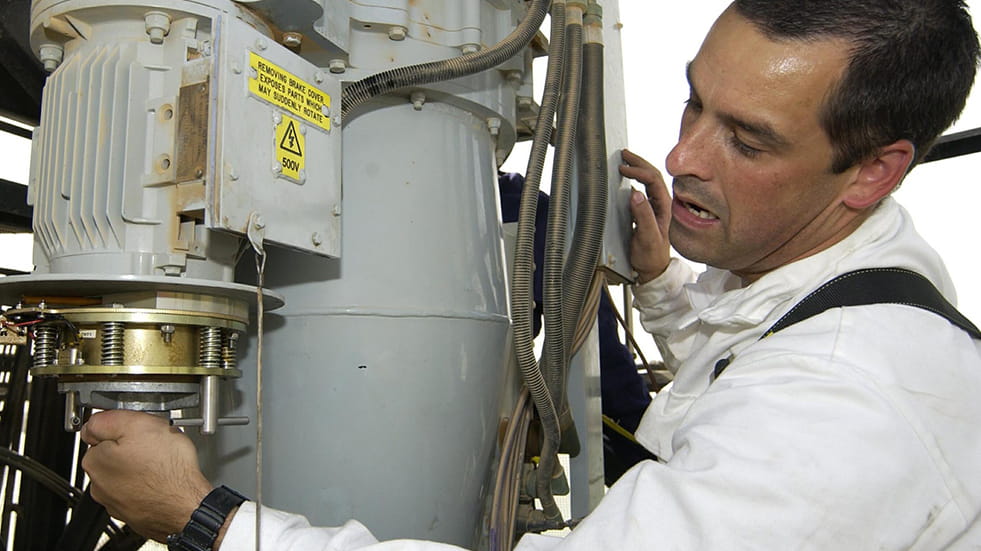Weapon Engineer Officer
You’ll lead a team of skilled engineers to ensure your ship’s efficiency as a state-of-the-art fighting machine.
- £31,000 - £110,500
- Undergraduate Degree
- Surface Fleet
- Engineering
- Officer level
£31,000
£38,500
£27,000
Register
Study
6 weeks

I get to work with a team of talented technicians, overseeing the work that keeps our ships fully operational and ready for action. It’s a lot of responsibility, but I wouldn’t have it any other way.
Role details
What you’ll do
As a Weapon Engineer Officer, you’ll be the person a team of skilled engineers look to for advice, guidance and support. As a systems engineer your work will be key to ensuring your ship can do its job; detecting threats with the ability to respond with force when necessary. That means managing a range of projects simultaneously, all with the aim of guaranteeing the potency of your vessel. If you can embrace this responsibility, you’ll be given the world-class training you need to succeed, a clear pipeline for progression and a £27,000 bonus just for joining and completing your training.
Your role
- Lead and manage a team of up to 60 technicians, from specialists in communications and IT, to those with a unique knowledge of explosives and electronic sensor systems.
- You’re the person who ensures the ship’s efficiency as a state-of-the-art fighting machine, guaranteeing the performance of our weapon, and sensor systems, so that we’re always able to fire quickly and with accuracy.
- Take responsibility for some of the world’s most advanced defence systems by using, developing and adapting your engineering knowledge in highly-challenging environments that are unique to Royal Navy life.
- Take advantage of wide-ranging career development opportunities, from promotion to becoming a Chartered Engineer and working alongside industry partners on new equipment development projects.
Pay & benefits
- A starting salary of at least £31,000, rising to around £38,500 just two years.
- A £27,000 joining bonus.
- Additional pay for each day spent at sea.
- An excellent non-contributory pension scheme – we pay into it for you, so you don’t have to sacrifice any salary.
- Six weeks of paid holiday every year.
- Extra financial bonuses if you’re on a longer operation.
- Amazing opportunities, including world travel and adventurous training for two weeks every year.
- Free gym and sports, from football to kayaking to kite-surfing.
- Forces Help to Buy scheme – a 0% loan to get you on, or further up, the housing ladder.
- Handy discounts with lots of top brands, from Marriott hotels to Audi cars and high street stores
Skills for life
Qualifications you'll gain
- Become an internationally recognised Chartered Engineer – we’ll support your registration.
Opportunities open to you
- There are many opportunities for post graduate study if you’re academically minded, including an MSc in Guided Weapon systems, Cyber Defence Information and Assurance, Explosive Ordnance Engineering, and Programme and Project Management.
Skills you'll develop
- Learn to work efficiently in a highly pressurised environment – no two days are ever the same.
- Mentor junior personnel and oversee complex projects.
- Gain an in-depth knowledge of complex weapon, sensors, communications and information systems.
- Become expert in how these systems are configured to operate as a state-of-the-art network.
Eligibility
- You’ll need to be aged 18 to 39
- All Science, Technology, Engineering and Mathematics (STEM) degrees will be considered
- You’ll need a minimum of 96 UCAS points. At least 64 points should be in maths and an engineering-based science. These can be accrued from either GCE A/AS Levels (or equivalent) or National Diplomas (e.g., BTEC)
- You'll need at least 5 GCSEs at grades A*-C (9-4) (or Scottish equivalent) which must include English Language and Mathematics
- A British or Irish National, or a Dual National. Dual nationality restrictions apply
- A Body Mass Index (BMI) between 18 and 28 (between 17 and 27 if under 18)
- Pass the Naval Swimming Test
Skills & interests
- An ability to thrive on responsibility and lead from the front
- Confidence making key decisions in high-pressure situations
- A passion for cutting-edge engineering and electronic equipment
- An aptitude for solving problems
Joining process
From picking your role to the first day of training; everything you need to know as an officer
Submit an application
Once you’ve registered your interest, we’ll be in touch to discuss your options
Defence Aptitude Assessment (DAA)
You’ll be tested on: Verbal Reasoning, Numerical Reasoning, Work Rate, Spatial Reasoning, Electrical Comprehension and Mechanical Comprehension.
To prepare, you can practise the DAA
Interview
Medical and eye tests
Pre-Joining Fitness Test (PJFT)
This involves completing a 2.4km run on a treadmill within a certain time, at a fitness centre near you
Interview
Admiralty Interview Board (AIB)
This stage is unique to officers and takes place in two parts. A Pre Recorded Interview (PRI) is an online assessment which assesses your motivation to join the Royal Navy as an officer and your awareness of the Royal Navy. The Group Planning Exercise (GPE) is the second stage of the AIB and is an online competency based assessment which will take place on a separate day to the PRI. It will be conducted in a virtual group environment and you will be assessed on your contribution to the team based on your individual performance
Career progression
Got a question?
Our virtual recruiter is available to answer your questions 24 hours a day
